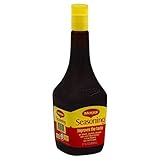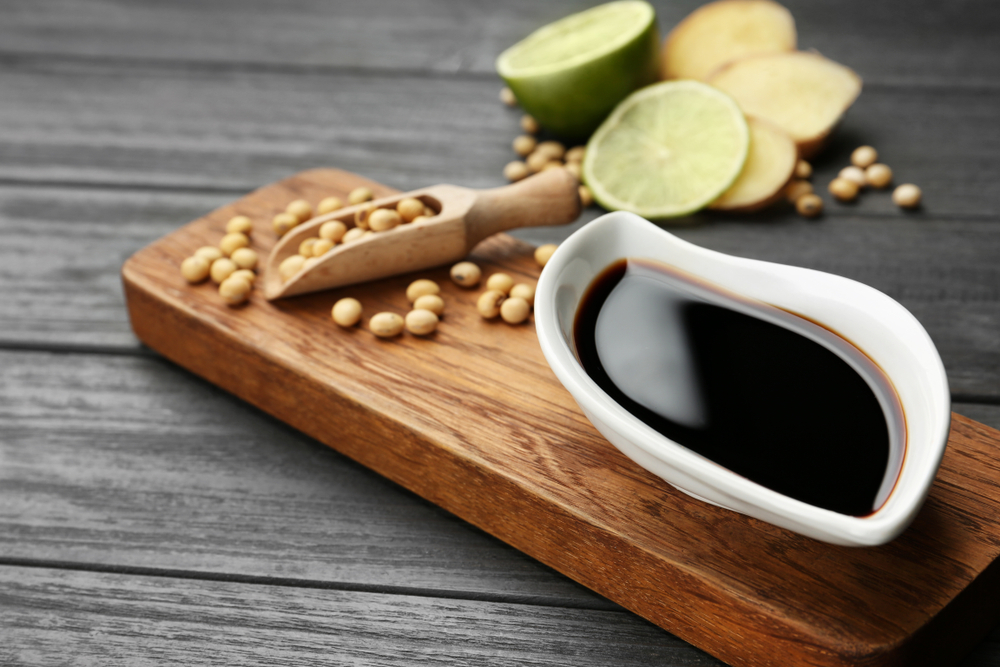It’s salty, it’s savory and it’s indicative of Asian cuisine, soy sauce is beloved by many in the United States but what is actually in this condiment? We put it on noodles, sushi, rice dishes, meat marinades and more but is this delightfully umami liquid acceptable for those following the keto diet?
Most brands of soy sauce are considered keto-friendly because they contain low to insignificant amounts of carbohydrates per serving (about 1 gram). There are some sweet soy sauce brands that should be avoided on keto. The best soy sauce alternatives that are also keto include Bragg Liquid Aminos, Coconut Secret Coconut Aminos, and Red Boat 40°N Fish Sauce.
Soy sauce has a long history and can come in many forms. Let’s take a deeper look at soy sauce and some keto-friendly alternatives for those looking to switch things up.
Contents
What is Soy Sauce?
Made of fermented soybeans and wheat, soy sauce is a traditional Asian condiment, that originated in China but most often seen in Japanese cuisine. It is one of the most popular soy products in the United States. There are many varieties that differ in color and flavor based on their origin, including light soy sauce (usukuchi), dark soy sauce (koikuchi), tamari, shiro (white) soy sauce, and saishikomi (double brewed) soy sauce.
Health Benefits of Soy Sauce
Soy sauce, specifically dark soy sauce, has been shown to have high levels of antioxidants. Consuming foods rich in these compounds can help to protect against free radicals and decrease risk of the development of various chronic diseases, including cancer. It is also rich in other essential nutrients such as B vitamins, potassium and magnesium [1].
Soy, the main component of soy sauce, is rich in isoflavones, a plant compound that mimics estrogen. Also known as phytoestrogens, isoflavones can act similar to estrogen in the body but its effects are a lot weaker. Some studies have found possible beneficial effects of isoflavones on age related diseases, such as cardiovascular disease, osteoporosis, cognitive decline and more [2].
Health Drawbacks of Soy Sauce
Aside from soybeans and wheat, salt is a necessary ingredient in soy sauce. Unfortunately, this results in a high sodium condiment, even when made as a reduced sodium version. Most soy sauces contain between 500-1000mg of sodium per 1-tablespoon serving.
The Dietary Guidelines for Americans recommends no more than 2300mg of sodium intake per day for adults. When looking at the popular brand, Kikkoman soy sauce, found in most grocery store chains in the United States, a 1-tablespoon serving contains 960mg of sodium, which is about 42% of your total daily recommended intake.
Low sodium options available don’t tend to show much improvement in this. Kikkoman low sodium soy sauce contains 575mg of sodium per 1-tablespoon serving, reducing the daily value down from 42% to 25%, which is still significantly high. A diet high in sodium can increase risk for the development of high blood pressure, a major cause of heart disease and stroke [3].
Nutrition Facts for Soy Sauce
Kikkoman Traditionally Brewed Soy Sauce
Ingredients:
- Water
- Soybeans
- Wheat
- Salt
Nutrition Facts (per 1-tablespoon):
- Calories 10
- Fat 0g
- Saturated fat 0g
- Sodium 960mg
- Carbohydrates 1g
- Sugar 0g
- Added sugar 0g
- Fiber 0g
- Protein 2g
Kikkoman Less Sodium Soy Sauce
Ingredients:
- Water
- Wheat
- Soybeans
- Salt
- Lactic acid
- Sodium benzoate (as a preservative)
Nutrition Facts (per 1-tablespoon):
- Calories 10
- Fat 0g
- Saturated fat 0g
- Sodium 575mg
- Carbohydrates 1g
- Sugar 0g
- Added sugar 0g
- Fiber 0g
- Protein 1g
Keto-Friendly Alternatives to Soy Sauce
Bragg Liquid Aminos
 With zero grams of carbohydrates per 1-teaspoon serving and low sodium than most, if not all, soy sauce brands, Bragg Liquid Aminos is a keto-friendly alternative to traditional soy sauce. With similar umami flavor, you can find this condiment at various in-store and online grocery retailers, including Walmart and Publix, priced at $4.49 for a 16-ounce bottle.
With zero grams of carbohydrates per 1-teaspoon serving and low sodium than most, if not all, soy sauce brands, Bragg Liquid Aminos is a keto-friendly alternative to traditional soy sauce. With similar umami flavor, you can find this condiment at various in-store and online grocery retailers, including Walmart and Publix, priced at $4.49 for a 16-ounce bottle.
Ingredients:
- Vegetable protein from soybeans
- Purified water
Nutrition Facts (per 1-teaspoon):
- Calories 5
- Fat 0g
- Saturated fat 0g
- Sodium 310mg
- Carbohydrates 0g
- Sugar 0g
- Added sugar 0g
- Fiber 0g
- Protein 1g
Coconut Secret Coconut Aminos Soy-Free Seasoning Sauce
 Significantly lower in sodium than traditional soy sauce, Coconut Secret coconut aminos is a common alternative used to soy sauce because of its taste similarities. It is also a great option for those needing a gluten-free or soy-free option. You can find this product online at various retail stores such as Target or Walmart at $6.39 for an 8-ounce bottle.
Significantly lower in sodium than traditional soy sauce, Coconut Secret coconut aminos is a common alternative used to soy sauce because of its taste similarities. It is also a great option for those needing a gluten-free or soy-free option. You can find this product online at various retail stores such as Target or Walmart at $6.39 for an 8-ounce bottle.
Ingredients:
- Organic coconut tree sap aged and blended with sun-dried, mineral rich sea salt
Nutrition Facts (per 1-teaspoon):
- Calories 5
- Fat 0g
- Saturated fat 0g
- Sodium 90mg
- Carbohydrates 1g
- Sugar 1g
- Added sugar 0g
- Fiber 0g
- Protein 0g
Red Boat 40°N Fish Sauce
 Another common condiment used in Asian cuisine, fish sauce is not only keto-friendly, but it is also Whole30 approved. This is another great gluten and soy-free alternative for those who need it.
Another common condiment used in Asian cuisine, fish sauce is not only keto-friendly, but it is also Whole30 approved. This is another great gluten and soy-free alternative for those who need it.
Be careful to use sparingly as this product contains a significant amount of sodium per 1-tablespoon serving. You can find this product online at Redboatfishsauce.com priced at $4.50 for a 100ml bottle.
Ingredients:
- Anchovy
- Sea salt
Nutrition Facts (Per 1-tablespoon):
- Calories 15
- Fat 0g
- Saturated fat 0g
- Sodium 1490mg
- Carbohydrates 0g
- Sugar 0g
- Added sugar 0g
- Fiber 0g
- Protein 4g
Maggi Seasoning Sauce
 Maggie seasoning sauce is similar to light soy sauce; however, it contains zero carbohydrates per serving. It also contains slightly less sodium than you would find in low sodium versions of soy sauce, but it contains more additives. It is a good soy-free alternative to soy sauces. You can find this product online or in-store at various retail sites, including Publix and Walmart, priced at $4.19 for an 8.7-ounce bottle.
Maggie seasoning sauce is similar to light soy sauce; however, it contains zero carbohydrates per serving. It also contains slightly less sodium than you would find in low sodium versions of soy sauce, but it contains more additives. It is a good soy-free alternative to soy sauces. You can find this product online or in-store at various retail sites, including Publix and Walmart, priced at $4.19 for an 8.7-ounce bottle.
Ingredients:
- Water
- Salt
- Wheat gluten
- Wheat
- Less than 2% of
- Wheat bran
- Sugar
- Acetic acid
- Artificial flavor
- Disodium inosinate
- Disodium guanylate
- Dextrose
- Caramel color
Nutrition Facts (per 1-teaspoon):
- Calories 0
- Fat 0g
- Saturated fat 0g
- Sodium 400mg
- Carbohydrates 0g
- Sugar 0g
- Added sugar 0g
- Fiber 0g
- Protein 0g
Bare Bones Broth Beef Bone Broth
 Although it is not as complex in flavor, beef broths can be used as a suitable alternative to soy sauces in some recipes. Bare Bones Broth beef bone broth is Keto and Whole30 friendly. It is also certified organic and made from grass-fed beef bones. You can find this product online at barebonesbroth.com priced at $10.99 for a 16-ounce container.
Although it is not as complex in flavor, beef broths can be used as a suitable alternative to soy sauces in some recipes. Bare Bones Broth beef bone broth is Keto and Whole30 friendly. It is also certified organic and made from grass-fed beef bones. You can find this product online at barebonesbroth.com priced at $10.99 for a 16-ounce container.
Ingredients:
- Water
- Beef bone broth
- Water
- Grass-fed beef bones
- Grass-fed beef tendon
- Organic mushrooms
- Organic onion
- Grass-fed ox tail
- Organic celery
- Organic tomato paste
- Organic apple cider vinegar
- Organic carrots
- Organic spices
- Beef broth
- Vegetable base
- Water
- Organic garlic
- Organic scallions
- Organic mushroom powder
- Organic tomato paste
- Organic spices
- Organic ginger juice
- Organic turmeric
- Mushroom base
- Organic portabella mushrooms
- Organic onion
- Organic garlic
- Organic spices
- Gelatin
- Sea salt
Nutrition Facts (per 1-container):
- Calories 80
- Fat 0g
- Saturated fat 0g
- Sodium 540mg
- Carbohydrates 0g
- Sugar 0g
- Added sugar 0g
- Fiber 0g
- Protein 20g
Robbie’s All Nature & Guilt Free Worcestershire
 Another keto-friendly condiment that has a similar umami flavor but arguably more complex is Worcestershire sauce. Although, it contains roughly the same amount of carbohydrates per serving as soy sauce, Robbie’s All Natural & Guild Free Worcestershire contains a minimal 20g of sodium compared to the 575-960mg found in most soy sauces.
Another keto-friendly condiment that has a similar umami flavor but arguably more complex is Worcestershire sauce. Although, it contains roughly the same amount of carbohydrates per serving as soy sauce, Robbie’s All Natural & Guild Free Worcestershire contains a minimal 20g of sodium compared to the 575-960mg found in most soy sauces.
You can find this product online at various retail sites, including healthyheartmarket.com, priced at $5.99 for a 10-ounce bottle.
Ingredients:
- Water
- Apple cider vinegar
- Blackstrap molasses
- White grape concentrate
- Tapioca starch
- Hydrolyzed soy protein
- Organic caramel color
- Garlic powder
- Salt
- Onion powder
- Spices
- Sugar
- Yeast extract
- Natural flavors
Nutrition Facts (per 1-teaspoon):
- Calories 5
- Fat 0g
- Sodium 20mg
- Carbs 1g
- Sugar 0g
- Fiber 0g
- Protein 0g
Related Questions
Is Soy Sauce the Same as Tamari?
Tamari is a variety of Japanese soy sauce similar in flavor and appearance to dark soy sauce with little to no wheat and a higher content of soybeans. It is strong in flavor and best used as a dipping sauce than for seasoning dishes.
Is Soy Sauce Fermented?
Yes, soy sauce is considered a fermented condiment. In fact, the fermentation is process is what yields the complex flavors of soy sauce.
Does Soy Sauce go Bad?
Soy sauce can lose flavor over time. However, it will not spoil for quite some time. In order to tell if your soy sauce has become spoiled, check the flavor and appearance of the sauce. If there is an off-odor and change in its appearance, it should be thrown out.
Can Soy Sauce be Substituted for Worcestershire Sauce?
Yes, Soy sauce can be used as an alternative to Worcestershire sauce at a 1:1 ratio just as Worcestershire sauce can be used in place of soy sauce. Although it does not have all the complex flavor components of Worcestershire, it contains a similar umami flavor.
Why Does Soy Sauce Have So Much Sodium?
Salt is one of the main components of soy sauce and is essential for the savory, umami flavor profile. Salt also acts a preservative to keep the product shelf stable. In Asian cooking, soy sauce is often used instead of salt to bring out the flavor.
